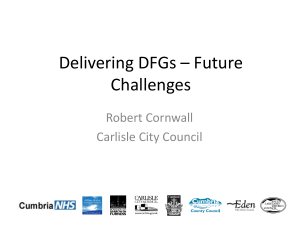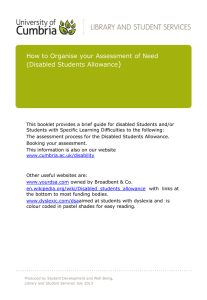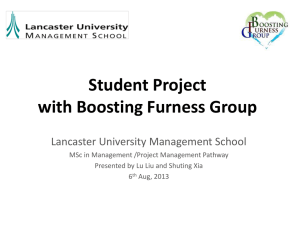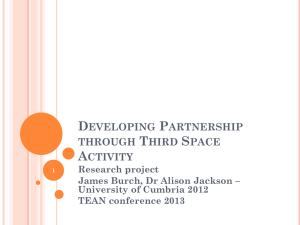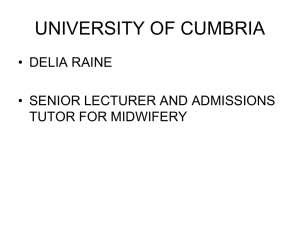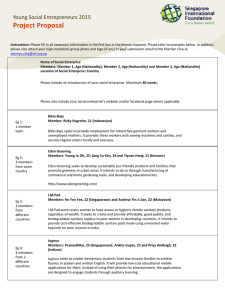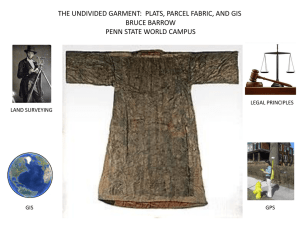Barrow in Furness Presentation - Cumbria Intelligence Observatory
advertisement
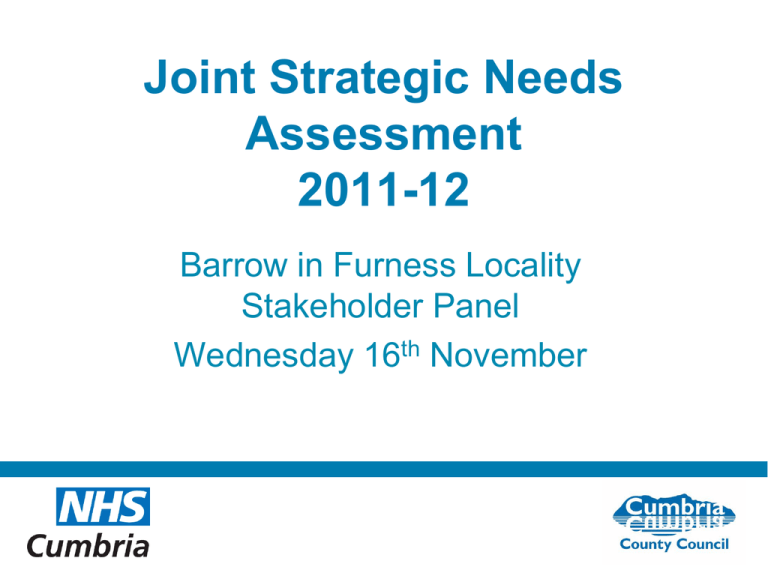
Joint Strategic Needs Assessment 2011-12 Barrow in Furness Locality Stakeholder Panel Wednesday 16th November Content • • • • • • • • Introduction to the JSNA Background & context Demand on health and social care system Long-term conditions Mental health & well-being Living conditions & health inequalities Lifestyle & behaviours Summary Welcome • Welcome to the JSNA locality stakeholder panel • Purpose – to begin the process of developing an enhanced JSNA for Cumbria • This is the responsibility of the Health and Wellbeing Board • Plan to have this in place by April 2012 • Feeds in to the Joint Health and Wellbeing Strategy (June 2012) What is a JSNA? • Describes health and wellbeing in Cumbria • Describes strategic direction of services • Based on wide range of current information and evidence • JSNA products, county and locality narratives, online information Who is involved? • • • • • • • Cumbria County Council NHS Cumbria Cumbria Intelligence Observatory District Councils Third Sector LINKs Probation, police and other partners Why do we need a JSNA? • Current JSNA needs to be updated • Important role in the Health and Social Care Bill • HWWB role in Joint Health and Wellbeing Strategy and JSNA • JSNA supports the Joint Health and Wellbeing Strategy (JHWBS) • Commissioning Plans 2013 need to take account of JHWBS What are the challenges? • • • • Ageing Population Mental health and alcohol issues Health of children and young people Health inequalities What do we want from you? • Your ideas and feedback on the information presented • Views on local needs and priorities • Information on local strengths and assets • Help to develop a local narrative for JSNA Overall Deprivation Score Dalton North Hawcoat Hindpool Central Barrow Island Roosecote Source: Indices of Deprivation 2010 Health Deprivation Score Source: Indices of Deprivation 2010 Life Expectancy Life Expectancy Source: Office for National Statistics Healthy Life Expectancy Rurality England Cumbria Urban > 10K - Less Sparse Urban > 10K - Sparse Tow n and Fringe - Less Sparse Tow n and Fringe - Sparse Source: Office for National Statistics, 2010 Village, Hamlet & Isolated Dw ellings - Less Sparse Village, Hamlet & Isolated Dw ellings - Sparse Barrow in Furness Rurality Aged 65+ England Cumbria Urban > 10K - Less Sparse Urban > 10K - Sparse Tow n and Fringe - Less Sparse Tow n and Fringe - Sparse Source: Office for National Statistics, 2010 Village, Hamlet & Isolated Dw ellings - Less Sparse Village, Hamlet & Isolated Dw ellings - Sparse Barrow in Furness Barriers to Services & Housing Ormsgill Roosecote Source: Indices of Deprivation, 2010 Context – Barrow in Furness Population 0-14 80 15-64 65+ “Known” Forecasted Population (000s) 70 60 50 40 30 20 10 0 1981 1985 1989 1993 1997 Source: Office for National Statistics 2001 2005 2009 Year 2013 2017 2021 2025 2029 2033 Median Household Income (£) Source: CACI Paycheck, 2011 People and Communities STRENGTHS WEAKNESSES Barrow is the second largest urban settlement in Cumbria The Borough has experienced overall loss of population since 1991 Recorded unemployment is low Levels of worklessness are amongst the highest in the UK Employment in the town has grown in the period 2003-2008 There are concentrations of deprivation in the town centre wards Some parts of the Borough achieve very high levels of attainment in education Educational attainment is generally below Cumbrian and regional averages Skill levels in the working population compare well with Cumbrian Averages Recent surveys indicate skills gaps in high level occupations Business and Enterprise STRENGTHS WEAKNESSES The shipyard has recently expanded its workforce to 5,200 The town is increasingly dependent upon BAe Systems and submarine manufacture Barrow hosts several large industrial employers including BAe Systems Several major industrial employers have announced recent redundancies There has also been growth in the service sector up to 2008 Some of the service sector growth has involved public sector services Tourism numbers and spend has been increasing from a relatively low base Rates of new business formation compare well with Cumbrian averages Infrastructure & Environment STRENGTHS WEAKNESSES Barrow has a distinctive urban form arising from its industrial heritage Barrow also has historic tourism assets and an attractive coast and rural areas Barrow is a self-contained housing market area and there is sufficient supply of housing Around half of the stock of housing predates 1919 and some is in very poor condition Barrow has a substantial supply of avaliable employment land Despite recent improvements, transport links are disadvantageous Community Safety • Levels of crime are falling (5.1% since last year) • Yet Barrow in Furness has the second highest rate of crime in the county • Levels of burglary at a dwelling, theft from a motor vehicle, theft of a motor vehicle and domestic violence are rising • Rates of alcohol specific mortality and hospital admissions attributable to alcohol are rising. Barrow in Furness is in the bottom 10% nationally in these measures • The typical offender in Barrow in Furness is likely to be aged 18-30 years and male • There is a clear correlation between levels of crime and deprivation with crime and disorder most prevalent in Central and Hindpool wards in Barrow Housing • The mean average house price in Barrow in Furness is £111,852, over £55,000 less than the county average of £167,455 • The mean housing affordability ratio for the district is 3.9, compared to 5.2 for Cumbria • 20.7% of households in Barrow in Furness are fuel poor, less than the county average of 24.1% Demand on the Health and Social Care System Per 1000 the population Health Demand Actual Barrow in Furness Cumbria Barrow in Furness Calls to Cumbria Health on Call 13,870 192 250 Less calls than Cumbria Admissions to hospital 10,047 139 115 More admissions than Cumbria Calls to the Ambulance Service 8,700 120 108 More calls than Cumbria Demand on the health and Social Care System Adults • 2832 adult social care service users accessing 9821 services • 1955 new referrals to adult social care services, with 847 resulting in a full assessment Children • 112 looked after children • 263 core assessments completed Demand on the Health and Social Care System Adult Social Care Barrow in Furness service users and services 15,000 10,000 5,000 0 no of service users Learning Disabailities Mental health Physical Disabilities Other Number of Services • 70% (1,977) of the adult service users are aged 65 and over • Over 1,100 safeguarding alerts come into adult social care every year Demand on the Health and Social Care System Housing need (Adults) Service Users Take-up of long-term residential care places for the LA-supported population, assuming projected falls in take-up of residential care 1800 1600 1400 1200 1000 800 600 400 200 0 Need for increase in alternative provision (other than long-term residential care) Future take-up of LA-funded long-term residential care places (based on service trends) Total need for support currently met by LAfunded residential care 2009 Source: Planning 4 Care 2014 2019 2029 Demand on the Health and Social Care System – Learning Disabilities Allerdale Barrow -in-Furness Carlisle Copeland Eden South Lakeland 12,000 10,000 2,002 2,048 2,094 2,132 1,958 994 1,015 1,031 1,049 972 6,000 1,316 1,348 1,374 1,398 1,420 4,000 2,029 2,098 2,156 2,208 2,276 1,306 1,319 1,322 1,325 1,335 1,762 1,790 1,807 1,834 1,862 2010 2015 2020 2025 2030 Number 8,000 2,000 0 2010-30 People aged 18 and over predicted to have a learning disability (Source: PANSI and POPPI based on Emerson and Hatton) Demand on the Health and Social Care System – Dementia Allerdale Barrow-in-Furness Carlisle Copeland Eden South Lakeland 14,000 12,000 3,337 10,000 2,814 Number 1,506 2,371 8,000 1,269 2,076 6,000 1,058 1,823 893 739 4,000 859 1,395 2,000 1,388 1,140 989 1,628 2,430 2,074 1,804 1,582 1,300 1,517 1,129 923 989 1,506 1,740 2,107 2,396 1,336 2010 2015 2020 2025 2030 0 Figure 14: 2010-2030 The number of people aged over 65 years predicted to have dementia (Source: POPPI) Long-term Conditions, Chronic Illness and Disabilities Years of life lost from Cancer Cumbria North West England 180 160 140 120 100 80 60 40 20 0 Allerdale Barrow Carlisle Copeland Eden South Lakeland Source: National Centre for Health Outcomes Development, 2007-2009 Long-term Conditions, Chronic Illness and Disabilities Years of life lost from Circulatory Disease Cumbria North West England 140 120 100 80 60 40 20 0 Allerdale Barrow Carlisle Copeland Eden Source: National Centre for Health Outcomes Development, 2007-2009 South Lakeland Long-term Conditions, Chronic Illness and Disabilities % of working age population with a disability Cumbria North West England 30% 25% 20% 15% 10% 5% 0% Allerdale Barrow Carlisle Source: Annual Population Survey, 2011 Copeland Eden South Lakeland Long-term Conditions, Chronic Illness and Disabilities % of children (0-16years) entitled to Disability Living Allowance Cumbria North West England 4.0% 3.5% 3.0% 2.5% 2.0% 1.5% 1.0% 0.5% 0.0% Allerdale Barrow Source: Annual Population Survey, 2011 Carlisle Copeland Eden South Lakeland Mental Health and Well Being % happy or very happy with life Cumbria North West England 100% 80% 60% 40% 20% 0% Allerdale Barrow Carlisle Copeland Eden Source: Quality of Life Survey, 2006 South Lakeland Mental Health and Well Being % satisfied with local area Cumbria North West England 100% 80% 60% 40% 20% 0% Allerdale Barrow Carlisle Copeland Eden Source: Place Survey Tracker 2009 South Lakeland Mental Health and Well Being Estimated neurotic disorder per 1000 Cumbria North West England 250 200 150 100 50 0 Allerdale Barrow Carlisle Copeland Eden Source: North East Public Health Observatory, 2008 South Lakeland Mental Health and Well Being Admissions for deliberate self harm per 100,000 Cumbria North West England 350 300 250 200 150 100 50 0 Allerdale Barrow Carlisle Copeland Eden Source: North West Public Health Observatory, 2009-10 South Lakeland Mental Health and Well Being Years of life lost from suicide Rate Cumbria North West England 40 30 20 10 0 Allerdale Barrow Carlisle Copeland Eden Source: National Centre for Health Outcomes Development, 2009-10 South Lakeland Living Conditions and Health Inequalities Infant mortality per 1000 births Rate Cumbria North West England Carlisle Copeland Eden 6 5 4 3 2 1 0 Allerdale Barrow Source: National Centre for Health Outcomes Development, 2009 South Lakeland Living Conditions and Health Inequalities % born with low birth weight (<2.5kg) Cumbria North West England 10% 8% 6% 4% 2% 0% Allerdale Barrow Carlisle Copeland Eden Source: National Centre for Health Outcomes Development, 2009 South Lakeland Living Conditions and Health Inequalities Teenage pregnancy rate Rate per 1000 Cumbria North West England 60 40 20 0 Allerdale Barrow CarlisleCopeland Eden Source: Office for National Statistics, 2007-2009 South Lakeland Living Conditions and Health Inequalities % children living in poverty Cumbria North West England 25% 20% 15% 10% 5% 0% Allerdale Barrow Source: HMRC, 2009 Carlisle Copeland Eden South Lakeland Living Conditions and Health Inequalities Claimant to vacancy ratio Rate Cumbria Great Britain England 14 12 10 8 6 4 2 0 Allerdale Barrow Carlisle Copeland Eden Source: Office for National Statistics, 2011 South Lakeland Living Conditions and Health Inequalities % working age adults with level 4 or greater education Cumbria North West England 50% 40% 30% 20% 10% 0% Allerdale Barrow Carlisle Copeland Source: Annual Population Survey, 2010 Eden South Lakeland Living conditions and Health Inequalities % working age adults with disabilities in employment Cumbria North West England 70% 60% 50% 40% 30% 20% 10% 0% Allerdale Barrow Carlisle Copeland Eden Source: Annual Population Survey, 2010 South Lakeland Living conditions and Health Inequalities Excess winter deaths Cumbria North West England 30 20 % 10 0 Allerdale Barrow Carlisle Copeland Eden Source: North West Public Health Observatory, 2006-2009 South Lakeland Living Conditions and Health Inequalities % of people who agree they can influence decisions in their area Cumbria North West England 50% 40% 30% 20% 10% 0% Allerdale Barrow Source: Place Survey Tracker, 2009 Carlisle Copeland Eden South Lakeland Lifestyle and Behaviours Estimated smoking prevalence Cumbria North West England 35 30 25 20 % 15 10 5 0 Allerdale Barrow Carlisle Copeland Source: North West Public Health Observatory, 2009-2010 Eden South Lakeland Lifestyle and Behaviours Smoking during pregnancy per 100 maternities Cumbria North West England 20 15 10 5 0 Allerdale Barrow Carlisle Copeland Source: North West Public Health Observatory, 2009-2010 Eden South Lakeland Lifestyle and Behaviours Hospital admissions due to alcohol Cumbria North West England Rate per 100,000 3000 2500 2000 1500 1000 500 0 Allerdale Barrow Carlisle Copeland Source: Local Alcohol Profiles for England, 2009-2010 Eden South Lakeland Lifestyle and Behaviours % reporting drunk and rowdy behaviour as a problem Cumbria North West England 35% 30% 25% 20% 15% 10% 5% 0% Allerdale Barrow Source: Place Survey, 2008 Carlisle Copeland Eden South Lakeland Lifestyle and Behaviours Estimated prevalence of drug misuse (crack and opiates) per 1,000 people Cumbria North West England 14 12 10 8 6 4 2 0 Allerdale Barrow Carlisle Copeland Source: North West Public Health Observatory, 2008-2009 Eden South Lakeland Lifestyle and Behaviours % of people engaging in moderate intensity sport and recreation Cumbria North West England 20% 15% 10% 5% 0% Allerdale Barrow Carlisle Copeland Source: North West Public Health Observatory, 2009-2010 Eden South Lakeland Lifestyle and Behaviours Healthy eating among adults Cumbria North West England 35% 30% 25% 20% 15% 10% 5% 0% Allerdale Barrow Carlisle Copeland Source: North West Public Health Observatory, 2006-2008 Eden South Lakeland Lifestyle and Behaviours % of children participating in PE Cumbria North West England 80% 70% 60% 50% 40% 30% 20% 10% 0% Allerdale Barrow Carlisle Copeland Source: North West Public Health Observatory, 2009-2010 Eden South Lakeland Lifestyle and Behaviours % of year six children obese Cumbria North West England 25% 20% 15% 10% 5% 0% Allerdale Barrow Carlisle Copeland Source: National Child Measurement Programme, 2009-2010 Eden South Lakeland
